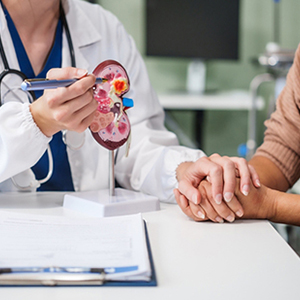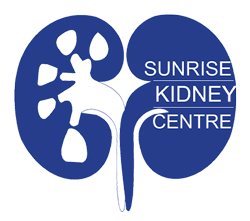Early sign of kidney disease :
When to see a nephrologist in Vijayawada
The kidneys play a crucial role in maintaining overall health, comparable to that of the heart and lungs. Their primary function is the elimination of waste products. Typically, individuals possess two kidneys, situated on either side of the spine beneath the lower ribs. These organs are shaped like beans and exhibit a reddish-brown hue. Each kidney is approximately the size of a clenched fist. The kidneys are responsible for filtering waste from the bloodstream and returning the purified blood to the body. Every minute, around one liter of blood, equivalent to one-fifth of the total blood pumped by the heart, enters the kidneys via the renal arteries. Once the blood has been filtered, it re-enters the body through the renal veins. A straightforward blood test suggested best nephrologist in Vijayawada, known as the glomerular filtration rate (GFR), assesses the efficiency of the kidneys in filtering blood. Additionally, a urine test may be conducted to detect the presence of albumin, a protein that can appear in urine when the kidneys are compromised.
Renal Failure
In the initial phases of chronic kidney disease, individuals may exhibit minimal signs or symptoms as per best nephrology doctor in Vijayawada. It is often the case that one remains unaware of having kidney disease until it reaches an advanced stage. The management of chronic kidney disease primarily aims to slow the advancement of kidney damage, typically by addressing the underlying cause. However, even with effective management of the cause, it may not be possible to prevent further kidney deterioration. Chronic kidney disease has the potential to advance to end-stage kidney failure, a condition that is life-threatening without the intervention of artificial filtration methods such as dialysis treatment in Vijayawada or a kidney transplant.
Who does kidney failure affect?
Kidney failure is a condition that can impact individuals regardless of their background. Nevertheless, certain factors may increase your likelihood of experiencing kidney failure, including:
- The presence of diabetes.
- The existence of high blood pressure (hypertension).
- A diagnosis of heart disease.
- A familial history of kidney-related ailments.
- Anomalies in kidney structure.
- Being over the age of 60.
- Have a prolonged history of using pain medications, including over-the-counter options like non-steroidal anti-inflammatory drugs (NSAIDs).
What happens when kidney failure starts?
Kidney health disease is classified into stages based on the estimated glomerular filtration rate (eGFR). The eGFR is an assessment of the kidneys' ability to filter substances from the blood, with a normal eGFR typically around 100. At Top-notch kidney care in Vijayawada, an eGFR of 0 indicates a complete loss of kidney function.
The stages of kidney disease per Best Kidney Specialist in Vijayawada are as follows:
- Stage I: The GFR is greater than 90 but less than 100. At this stage, there is mild damage to the kidneys, yet they continue to function normally.
- Stage II: The GFR ranges from 60 to 89. There is more significant damage to the kidneys compared to stage I, although they still operate effectively.
- Stage III: The GFR can be between 30 and 59. This stage may involve either mild or severe impairment of kidney function.
- Stage IV: The GFR falls between 15 and 29, indicating a severe reduction in kidney function.
- Stage V: The GFR is below 15, signifying that the kidneys are approaching or have reached complete failure.
Symptoms
Kidney failure, also known as renal failure, occurs when one or both kidneys are unable to perform their functions effectively. This condition can manifest as either acute kidney failure, which arises suddenly and may be temporary, or chronic kidney failure, which is a long-term ailment that deteriorates gradually. Kidney failure represents the most advanced stage of kidney disease and can be life-threatening without appropriate medical interventional Nephrology. In the absence of treatment, individuals with kidney failure may only survive for a few days or weeks. The signs and symptoms associated with chronic kidney disease typically develop progressively as kidney damage advances. A decline in kidney function can lead to the accumulation of fluids, waste products, or imbalances in electrolytes. The severity of renal failure and symptoms of kidney disease can result in various complications as follows.
- Nausea
- Vomiting
- Decreased appetite
- Fatigue and weakness
- Sleep disturbances
- Altered urinary frequency
- Reduced cognitive clarity
- Muscle cramps
- Swelling in the feet and ankles
- Dry and itchy skin
- Difficult-to-manage high blood pressure (hypertension)
- Shortness of breath due to fluid accumulation in the lungs
- Chest pain resulting from fluid accumulation around the heart's lining
The indicators and symptoms of kidney disease frequently lack specificity, implying that they may also arise from various other medical conditions. Due to the kidneys' capacity to compensate for diminished function, you may not experience any signs or symptoms until irreversible damage has taken place. Therefore, it is better to get it checked in Nephrology Hospital in Vijayawada by one the best Nephrologist in Vijayawada, Dr. M.V. SAI KRISHNA
Most common causes of kidney failure?
Diabetes and hypertension are the primary contributors to chronic kidney disease and renal failure. If diabetes is not properly managed, it can result in elevated blood sugar levels, known as hyperglycemia. Persistently high blood sugar can inflict damage on the kidneys and other vital organs. Hypertension, characterized by the forceful flow of blood through the body's vessels, can, over time and in the absence of treatment, harm the tissue of the kidneys.
When to see a doctor
It is advisable to schedule an appointment with your best nephrologist in Vijayawada if you exhibit any signs or symptoms indicative of kidney disease. Timely identification of the condition may assist in averting the progression of kidney disease to kidney failure. For individuals with medical conditions that elevate the risk of developing Chronic kidney disease, it is possible that your physician will assess your blood pressure and kidney function through urine and blood tests during your consultations. Inquire with your doctor regarding the necessity of these tests for your situation.
Kidney failure diagnosis
A healthcare professional may employ various kidney function assessments to evaluate renal health and diagnose potential kidney failure. If there is a suspicion of an increased risk for kidney failure, the following Kidney function tests are commonly utilized by the best nephrologist in Vijayawada :
- Blood tests. These tests assess the efficiency with which your kidneys filter waste from your bloodstream. A healthcare professional will use a fine needle to draw a small blood sample from a vein in your arm, which will subsequently be analyzed in a laboratory.
- Urine tests. These assessments evaluate specific components in your urine, such as protein or blood. You will provide a urine sample in a designated container at a healthcare facility. Technicians will then conduct an analysis of your urine sample in a laboratory setting.
- Imaging tests. These procedures enable a healthcare provider or the nephrology hospital in Vijayawada to visualize the kidneys and adjacent structures to detect any abnormalities or obstructions. Common imaging modalities include kidney ultrasound, CT urogram, and MRI.
Your kidneys play an essential role in your body by eliminating waste and excess fluid. In the event of renal failure signs, their functionality is significantly impaired, which can be life-threatening without appropriate intervention. Options such as dialysis or a kidney transplant can enable you to maintain a prolonged life. Additionally, your treatment regimen may involve the use of medications and adherence to a specific dietary plan as suggested by best kidney specialist in Vijayawada. It is crucial to attend all scheduled appointments. Should you have any inquiries or concerns regarding your treatments, medications, lifestyle modifications, or any other aspect of your treatment plan, please consult a healthcare professional.
Blogs Navigation


